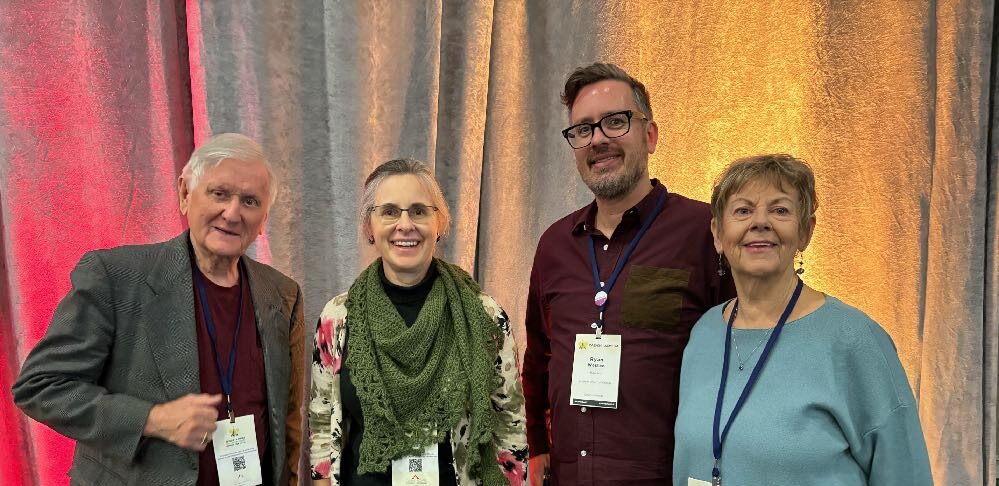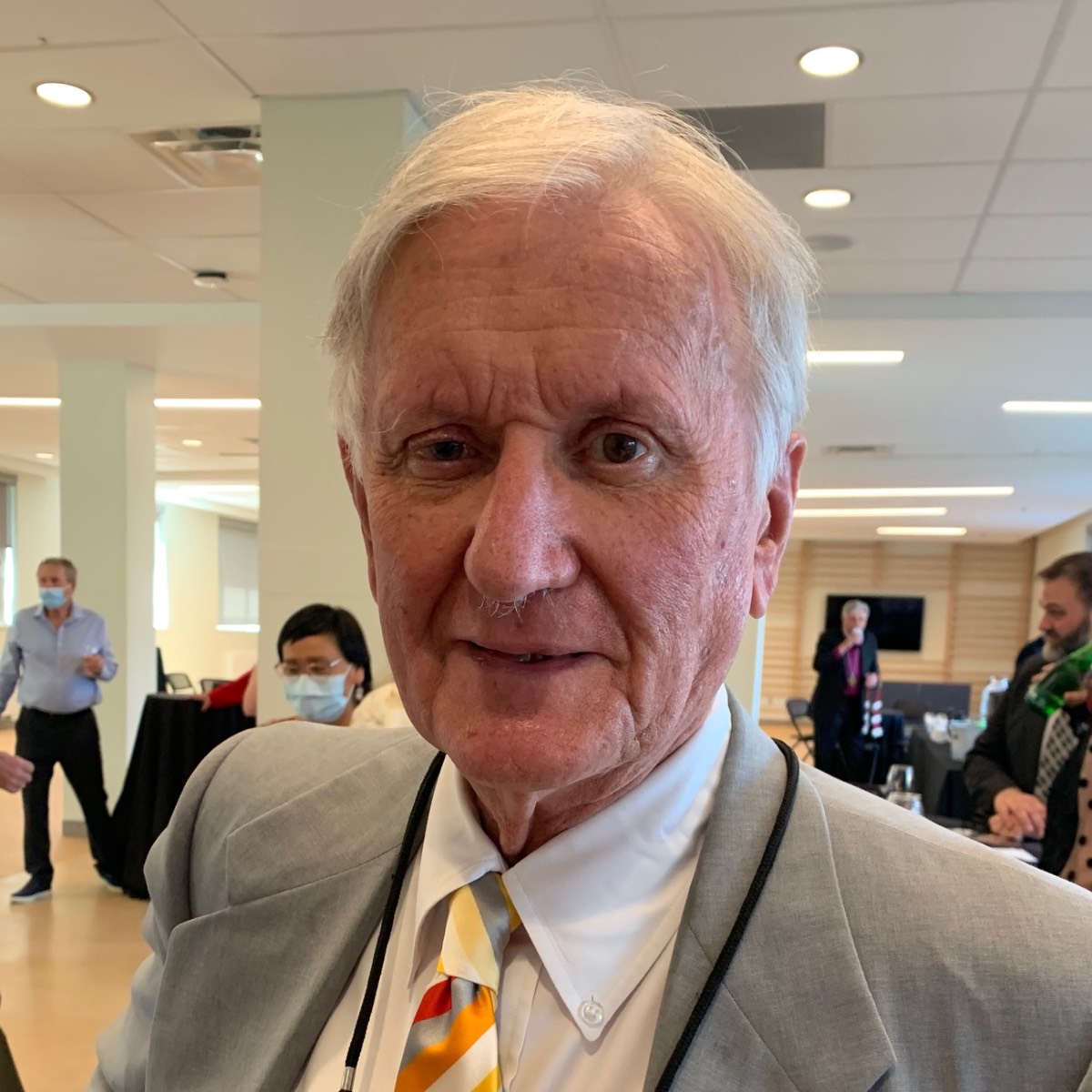The Anglican Diocese of Ottawa’s delegates to the National Conference on Ending Homelessness went home with challenges and a wealth of information to share with the renewed Bishop’s Panel on Housing Justice and the wider community.
Sue Garvey, chair of the panel (formerly known as the diocesan Homelessness and Affordable Housing Working Group), offered two questions in particular to address:
- How can we increase the voice with those of lived experience in the work of the diocese, its committees and advisory bodies?
- How can we connect the work of the Bishop’s Panel with the work of the National Anglican Church?
Garvey represented the diocese along with the Ven. Kathryn Otley, Incumbent of All Saints Westboro and Archdeacon of Central Ottawa, at the conference held in Ottawa from Oct. 29 to 31. Representing the Anglican Church of Canada was Ryan Weston, lead animator, public witness for social and ecological justice for the national church.
They joined a record 2,000 delegates, including frontline workers, policy makers, funders, researchers, advocates, politicians, volunteers, and 300 people with lived experience in homelessness, who are working to end homelessness in their communities.
Tim Richter, president and CEO, said the alliance is retooling to deliver more resources to local service providers to respond to a “lethal upward trajectory” of homelessness.
“Every day, hundreds, if not thousands, of people are lifted out of homelessness across Canada,” he said. “But homelessness grows because unaffordable housing markets throw thousands more onto the street.”
A current initiative, a new Encampment Response Service: a step-by-step service of community-wide supports, was promoted by the alliance in two sessions.
Sean Fraser, minister of Housing, Infrastructure and Communities, announced the Homelessness Reduction Innovation Fund, a $50-million fund to help communities develop innovative projects to prevent homelessness and accelerate new homes for people currently experiencing homelessness.
The need for full engagement of those with lived experience in developing responses was among the main takeaways for the Ottawa group. “Nothing about us without us,” one presenter said.
The conference heard evidence of the need to change the way advocates communicate about homelessness and affordable housing. In other words, put a human face on the issue. Tell stories with impact that invoke emotion and inspire.
Mark Horvath, founder of Invisible People, an American non-profit that specializes in story-telling to change public perceptions, said the public doesn’t relate well to expert discourse. “We need to amplify the voice of lived experience.”
In terms of lessons learned, Archdeacon Otley rated effective advocacy highly important. Harmful discourse gains currency, acquires misinformation through social media and leads to fear of a threat to social norms. The curtailing of harm reduction strategies is a perfect current example, she said. “It is essential to counter harmful discourse at its source with factual information.”
While the Ottawa delegates heard a few references to faith groups— the role of churches with property and the work of chaplains such as the Rev. Hilary Murray at Cornerstone Housing for Women were mentioned—but the contributions they make weren’t well represented at the conference.
Archdeacon Otley suggested consideration be given to offering a session at the 2025 conference in Montreal on the theme of faith groups as partners in ending homelessness.
Conference takeaways
- The face of homelessness is disproportionately Indigenous. There is a need to engage Indigenous communities in Indigenous solutions and leadership.
- Housing is and must be seen as a human right. There is a need to pursue a Right to Housing eco-system, a preferred approach to housing initiatives. As Guy Felicella, a harm reduction advocate and keynote speaker said: “We’ve made housing a privilege in this country instead of a human right…that has to change.”
- The connection between housing and health should be amplified. Housing is a health issue, a social determinant. You can’t have one without the other.
- Canadians are very concerned about the homelessness issue, housing affordability and homeless people. They believe that mental health and addictions are main factors, but they primarily believe that homelessness is a failure of leadership.
- A communications handbook: How We Talk about Homelessness in St. John’s (Wecandoit.com) could be useful in shaping educational tools for the Bishop’s Panel on Housing Justice. https://wecanendit.com/handbook
Cornerstone project was highlighted
Cornerstone Housing for Women’s Aging in Home Program was featured in a panel discussion on Innovative Practices in Housing and Homelessness in Ottawa at the National Conference on Ending Homelessness.
Devika Pawar, Cornerstone senior manager of supportive housing, said the program prioritizes holistic well-being for those aging at home. “Our services include accessible medical support, nurturing spiritual care and harm-reduction practices that enhance safety and health.”
She appeared with representatives of Shepherds of Good Hope, John Howard Society of Ottawa, Ottawa Inner City Health and Youth Services Bureau.
Cornerstone is a Community Ministry of the Anglican Diocese of Ottawa.
The audience of about 100, many from other parts of Canada, registered agreement with the panelists that close collaboration is the key to their success in solving many problems.
“We service providers in Ottawa work in a web,” Adrienne Sesiakin, senior manager in supportive housing at Shepherds of Good Hope, said. “We are always consulting each other on the best solution to a problem.”
Related story:
Rural areas need more services for homeless
Read more here:
www.ottawa.anglican.ca/housing-justice/


Week of Prayer for Christian Unity annual service to be celebrated at Saint Paul University on Jan. 22